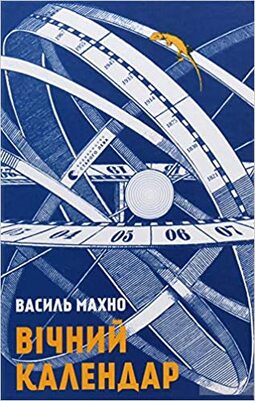 Many readers have told me how much they have enjoyed my book reviews in recent weeks, so here is another tome for you to keep an eye out for. Eternal Calendar is the debut novel by celebrated Ukrainian poet and essayist Vasyl Makhno and recently won the inaugural Ukrainian-Jewish Literary Prize, run by Canadian non-profit organisation Ukrainian Jewish Encounter and Ukrainian NGO Publishers Forum. Unfortunately, the book, published in 2019 in Ukrainian as Вічний календар, is not yet available in translation but this no doubt will be rectified soon – although translating a work of such depth and complexity would be no easy task. The book is a panoramic narrative about the lives of Ukrainians, Poles, Jews and Armenians from the 17th century to the present day. In an interview after the publication of this novel, Vasyl Makhno – who has lived in New York for the last two decades – said that he had wanted to write an epic work about small places and to depict the particular “dirt of life”. According to a review in The Ukrainian Weekly, the book, on a macro level, is a family saga, while on a micro level, it contains a number of stories within the stories and dramatised narratives. The novel follows the family histories of several generations, all coming from one area in western Ukraine, or eastern Galicia, centring on the village of Yazlivets and cities of Buchach and Chortkiv, where the author grew up. The novel is divided into three parts. The first is set during the Polish-Ottoman war of 1672-1676 and its aftermath, intertwining events in both local and world history of the time. The second part takes place during World War One, specifically the Brusilov offensive of 1916, and features the rise of Chortkiv as a centre of European Hasidism. The third part brings the story almost up to date, covering the period from the end of the Second World War to the decline of the 1970s and 1980s. In the final chapter, the protagonist travels back to Ukraine from his home in New York, where he has lived since the 1990s, to visit the places where he grew up. He is looking for the remains of the Armenian cemetery, and finds the location with the help of an elderly resident. He learns that no one else remembers the Armenian community anymore, and there is nothing left of the cemetery. This sounds profoundly sad and reminds me of my trip to Ukraine in 2005 to visit the locations where my family had lived, and died. My grandmother had talked of the Armenian quarter in her home shtetl of Pavolitch, but no sign of it remained, and the Armenians who had once lived there appeared to have been completely forgotten. And in most of the villages I visited, nothing at all was left of the much larger Jewish communities that had lived there for generations. In the village of Khodarkov we met a 95-year old lady who remembered the pogrom that members of my family had fled. But none of the towns and villages we visited were still home to any of the Jewish families that had lived there before the World War Two. The small numbers of resident Jews arrived after the war. Often not even the Jewish cemetery remained – the Nazis used Jewish gravestones for road building. “Vasyl Makhno’s novel Eternal Calendar still encompasses me. The novel is great and majestic, like both the whole planet and the separate Tower of Babel, in which people who have lost a common language try to understand each other with their eyes and deeds,” says internationally best-selling writer Andrey Kurkov, who headed the prize’s international jury. Incidentally, if you’re not familiar with Andrey Kurkov’s own writing, I can wholeheartedly recommend Death and the Penguin, widely available in English and one of my all-time top ten novels. Although set in Ukraine, it doesn’t contain a Jewish element so has no place in my blog, but I urge you to read it anyway. The other shortlisted books for the 2020 Ukrainian-Jewish Literary Prize were My Grandfather Was the Best Dancer of Them All by Kateryna Babkina; Teacher of German by Iryna Vlasenko; A Story Worth a Whole Apple Orchard by Maksym Dupeshko; and Babyn Yar: In Voices by Marianna Kiyanovska. If you have read any of the books that have featured in my blog this year, please do post your comments and let me know what you thought of them.
0 Comments
Leave a Reply. |
Keeping stories aliveThis blog aims to discuss historical events relating to the Jewish communities of Ukraine, and of Eastern Europe more widely. As a storyteller, I hope to keep alive stories of the past and remember those who told or experienced them. Like so many others, I am deeply troubled by the war in Ukraine and for the foreseeable future, most articles published here will focus on the war, with an emphasis on parallels with other tumultuous periods in Ukraine's tragic history. Archives
March 2024
Categories
All
|
 RSS Feed
RSS Feed
